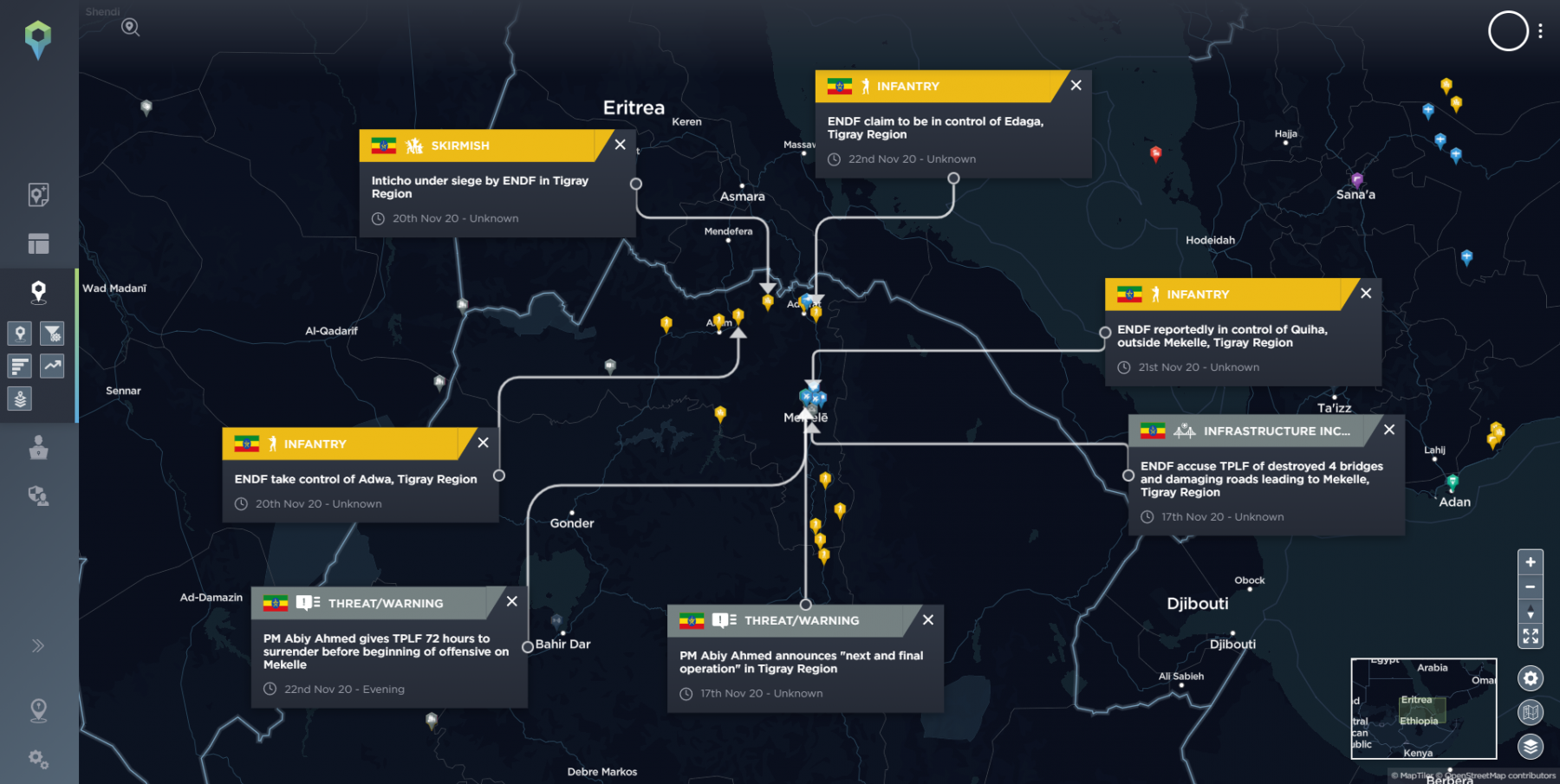Explaining the political crisis in Ethiopia
Fighting has erupted in the northern region of Ethiopia following months of feuding between the government and regional leaders in Tigray. The political crisis has significantly destabilised the country whilst taking the lives of hundreds and displacing thousands.
The federal government declared a state of emergency in the Tigray Region on the 4th November 2020 and launched an offensive, claiming that the Tigray People’s Liberation Front (TPLF) attacked bases of the northern command of the ENDF in the Tigray Region. The TPLF initially denied this. However, top TPLF official, Sekoutoure Getachew, seemingly confirmed the government’s claim, stating that pre-emptive strikes were carried out in ‘self-defence’.
The TPLF were a core party in the EPRDF coalition and played a dominant role within the military, ideologically and politically. However, their influence has dwindled in the years since Prime Minister Abiy Ahmed’s Prosperity Party came into power and began pursuing reforms.
Relations between the Tigray regional government and the federal government have rapidly deteriorated since April 2020 after the Tigray regional government objected to the postponement of the election. In September, the Tigray regional government defied the federal government to hold parliamentary elections. Later in October, the TPLF stated that they wouldn’t accept or recognise any policy decision from the federal government and the political crisis in Ethiopia began.
Capabilities in Tigray
The chairman of the TPLF has claimed that most of the federal army stationed in Tigray is under the TPLF control, which the Ethiopian government denied. Regional sources claim that dozens of soldiers in the Northern Command remain in their barracks and are not taking part in fighting. The TPLF have decades of experience in fighting asymmetric and conventional warfare and there 30,000 to 60,000 fighters are well trained. There are reported to be 40,000 to 50,000 ENDF and pro-government militia fighting the TPLF. While the ENDF have aerial dominance, the TPLF are said to possess S-75 and S-125 surface-to-air missile systems. While there have been unsubstantiated reports of a fighter jet shot down by the TPLF, they have demonstrated their military capability and proficiency by successfully targeting the Bahir Dar, Gondar and Asmara airports. The TPLF have warned that rocket strikes, including in Massawa and Asmara, will continue to thwart military movements.
While there have also been reports of shelling across the border from Zalambessa, there is potential for the war to further escalate regionally. Though the Ethiopian government have denied Eritrean involvement, two diplomats have said it is highly probable that Eritrean troops crossed the border into the Tigray Region. The TPLF claim that 16 brigades of the Eritrean army are involved in fighting. Refugees who crossed into Sudan have also reported that they saw Eritrean soldiers fighting against the TPLF alongside government forces. The involvement of Amhara militias in fighting alongside the ENDF could see fighting take the form of ethnic violence and spread further towards more central areas of Amhara Region.

Selection of incidents across Ethiopia with regards to the ongoing political crisis and fighting as of November 2020. [Source: Intelligence Fusion]
The Ethiopian Air Force have been conducting airstrikes targeting military hardware, including artillery batteries and rocket platforms, and arms depots, according to PM Abiy Ahmed. However, refugees that fled into Sudan claim airstrikes have killed civilians.
There is potential for the war to escalate regionally, with reports by the TPLF that Eritrean forces have been involved in fighting, whereas the involvement of Amhara militias in fighting alongside the ENDF could see fighting take the form of ethnic violence and spread further towards more central areas of Amhara Region.
The TPLF has also accused the federal government of being supported by “non-African actors”, a reference diplomats said was to potential help from the United Arab Emirates, which has a military base at Assab, an Eritrean port on the Red Sea. The UAE has in recent years turned Assab into a strategic hub for its military operations in Yemen.
Incidents
The ENDF and pro-government forces have seized towns south and north of Mekelle over the past seven days and are advancing towards Mekelle, the capital of Tigray Region. PM Abiy Ahmed on 22 November gave the TPLF 72 hours to surrender and warned they will encircle Mekelle with tanks and attack the city. The TPLF have rejected the ultimatum and said they will continue to fight.
The PM suggested last week that the fighting was coming to an end, saying “the final critical act of law enforcement will be done in the coming days”.
As fighting continues, there are concerns that other ethnic groups that have been pushing for more autonomy may look to exploit the current instability. This may have factored into PM Abiy Ahmed’s use of Amhara militias in Tigray. Recent violence in Konso and Ale Special Woredas in SNNPR, clashes in Sitti Zone and violence in Oromia Region and Benishangul-Gumuz Region may escalate if the war in Tigray Region requires further resources as groups such as the OLA/OLF Shene look to exploit gaps in capacity.
The civil war in Libya had major regional security implications and if the current conflict in Tigray Region was to escalate, there would be ramifications of a similar magnitude in the Horn of Africa. Ethiopia is an important diplomatic and security partner in the Horn of Africa. The recent arrest of 14 suspected ISIS and Al Shabaab members offers a timely reminder of the terrorist threat in the region and how jihadist groups are continually looking to take advantage of political instability and ethnic strife.
Threat intelligence is key to managing and maintaining business continuity during these uncertain times. Reliable, fact-checked data can provide you with an advantage not only when responding to unrest, but in terms of spotting potential actions and identifying trends through indicators and warnings. Intelligence Fusion will continue to provide timely alerts on the ongoing fighting as well as report on the wider impacts of the political crisis in Ethiopia.
For more information or to take a closer look at the data that supports our analysis, access a free trial of Intelligence Fusion by speaking to a member of our team today.
